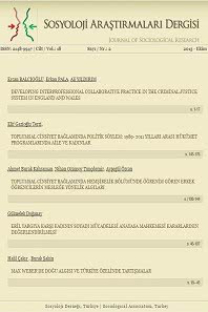Elit Teorisi Işığında Günümüz Türk Toplumunun Genel Bir Değerlendirmesi
Çalışmanın temel amacı, Türk toplumunun iktidar yapısını anlayıp, güç ilişkilerini analiz etmektir. Ayrıca, günümüz Türk toplumunda elit dolaşımım ve bu süreci etkileyen faktörleri ortaya koymak da çalışmanın temel amaçlarmdandır. Çalışmanın teorik temelini, elit teorisi, özellikle de onun temel açılımlarından olan demokratik elit teorisi ve demo-elit perspektif oluşturmaktadır. Temel veri kaynağı olarak, Arslan tarafından 1994-2001 yılları arasında, elit sosyolojisinin yöntemleri (Hertz, 1995; Moyser & Wagstaffe 1987) kullanılarak gerçekleştirilen 3 ayrı saha araştırmasından elde edilen bulgular kullanılmıştır. Günümüz Türk toplumunda toplumsal ve siyasi güç, birden fazla elit grubu arasında dağılmış durumdadır. Bununla birlikte bu elit gruplarının iktidar pastasından aldıkları pay eşit değildir. Türkiye'de toplumsal hayatta güçlü bir konuma ulaşabilmede eğitim anahtar etken konumuna dönüşmektedir. Türkiye'de bireylerin, toplumsal yapı içinde etkin ve saygın bir konum elde edebilmelerinde önemli rol oynayan bir başka etken de ailesel öz geçmiş (toplumsal köken)'dir: Ayrıcalıklı aile bağları ve akrabalık ilişkileri, elit dolaşımı süreci üzerinde hem doğrudan, hem de dolaylı etkiye sahiptir.
___
- ARON, R. (1950), "Social Structure and the Ruling Class", British Journal of Sociology, Vol. 1.
- ARSLAN, A. (1999a), "Researching Sensitive Topics with Elites: Perspectives, Problems and Outcomes", Guildford: University of Surrey.
- ARSLAN, A. (1999b), Who Rules Turkey: The Turkish Power Elite and the Roles, Functions and Social Backgrounds of Turkish Elites, Guildford: University of Surrey, Department of Sociology (PhD Thesis).
- ARSLAN, A. (1995), Turkish Political Elites: Top Political Leadership in Turkey and Social Construction of Turkish Political Elites, Guildford: University of Surrey, Department of Sociology (MSc.Thesis).
- BACHRACH, P. & Baratz, M. (1962), "Two Faces of Power", American Political Science Review, vol. LVI.
- BELL, D. (1973), The Coming of Post-industrial Society, New York: "Penguin Books.
- BOTTOMORE, T. (1993), Class and Elite Theory, Elites and Society, London: Routledge.
- ÇAĞLAR, A. & ARSLAN, A. (2000), "Cumhuriyet'ten Günümüze Türk Siyasi Liderleri: Atatürk'ten Demirel'e Üst Siyasi Elitler", Hacettepe Üniversitesi İktisadi ve İdari Bilimler Fakültesi Dergisi, Cilt: 18, Sayı: 2, ss. 499-514.
- ETZIONI-HALEVY, E. (1997), Class & Elites in Democracy and Democratisation, New York: Garland Publishing.
- ETZIONI, H. (1993), The Elite Connection, London: Polity Press.
- FIELDING, J. (1994), SPSS for Windows V. 6.0, Guildford: University of Surrey.
- FREY, W.F. (1965), The Turkish Political Elite, Massachusetts: MIT Press.
- GIDDENS, A. (1980), The Class Structure of Advanced Societies, London: Hutchinson.
- HERTZ, Rosanna & Imber, Jonathan B. (1995), Studying Elites Using Qualitative Methods, London: Sage.
- JARY, D. & Jary, J. (1991), Dictionary of Sociology, Glasgow: Harper Collins.
- MILLS, C.W. (1956), The Power Elite, London: Oxford University Press. MOSCA, G. (1939), The Ruling Class, New York: McGraw Hill.
- MOYSER, G. & Wagstaffe, M. (1987), Research Methods for Elite Studies, London: Allen & Unwin.
- OYEN, E. (1990), Comparative Methodology: Theory and Practice in Internatioanal Social Resarch, London: Sage.
- PARETO, V. (1968), The Rise and Fall of the Elites, New Jersey: The Bedminster.
- PUTNAM, R. (1976), The Comparative Study of Political Elites, New Jersey: Prentice Hall.
- SCHUMPETER, J. (1992), Capitalism, Socialism and Democracy, London: Routledge.
- ISSN: 2148-9947
- Yayın Aralığı: Yılda 2 Sayı
- Başlangıç: 2010
- Yayıncı: Sosyoloji Derneği
